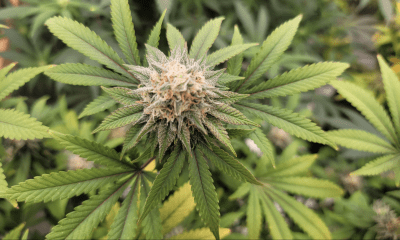Politics
Vermont Governor ‘At The Table’ On Marijuana Legalization Talks, Top Lawmaker Says

Vermont Gov. Phil Scott (R) is “at the table” as lawmakers work to pass a bill to tax and regulate marijuana sales in the state, a top legislative leader said in a recent interview.
The governor’s reported openness to establishing a commercial cannabis market is a notable policy shift, as he’s previously voiced opposition to such a model, citing concerns about impaired driving.
But according to House Majority Leader Jill Krowinski (D), conversations about taxing and regulating marijuana in Vermont have been productive, and she expressed optimism that Scott will lend his support as the legislature takes up the issue.
“I think that when we get that to the floor, it’s going to have strong tri-partisan support,” she told Vermont Conversation host David Goodman. “And so far the indications we’re getting from the governor is he’s at the table and interested and so I hope that’s one we can move forward and have his support on.”
“There’s been a lot of work done on this bill that is currently under consideration in the House to move Vermont towards a system where marijuana is taxed and regulated,” she said. “I think there’s a lot of interest from the governor on this bill and even use some of the funding for some of his programs and ideas, taking some of the money that would come from a taxed system for marijuana.”
Listen to Krowinski’s marijuana comments, around 17 minutes into the audio below:
That’s consistent with what Administration Secretary Susan Young said earlier this month, telling Vermont Public Radio that it “might be a good use of any [cannabis tax] revenues” to partly fund Scott’s proposed after-school program.
Scott may face additional pressure to support a tax-and-regulate model from the state’s lieutenant governor, David Zuckerman (P), who is running against him this year and who has been a leading voice for creating a legal commercial marijuana system.
Vermont legalized cannabis without a retail element in 2018, but Krowinski said she’s heard from people from a wide range of political backgrounds who argue that “legalization is one step, [but] we need to get to the regulated step.”
“States around us are coming to that place as well, and we need to put a system in place if other states are going to be doing that as well,” she said. “All different types of arguments for a tax and regulated system: racial justice, criminal justice, other factors at play.”
Matt Simon, New England political director for the Marijuana Policy Project, told Marijuana Moment that the organization would “like nothing more” than to see the governor sign off on pending marijuana commercialization legislation so that the state can “move forward with sensible regulation of cannabis sales.”
“The majority leader is correct that Vermonters from a wide range of backgrounds are supportive of S. 54, and the bill enjoys strong support in both the House and Senate,” he said. “Vermonters of all political stripes are ready to see S. 54 pass, and we hope the governor will agree it deserves his full support.”
There’s a growing sense of inevitability that a cannabis commerce bill will advance in Vermont this session, as neighboring states continue to pursue legalization as well. Other leaders in the legislature, including House Speaker Mitzi Johnson (D), have indicated that 2020 could be the year create a commercial marijuana market.
Johnson said last month that “there is a solid tri-partisan majority in the House that would like to see tax and regulate pass this year.” Meanwhile, Senate President Pro-Tem Tim Ashe (D) said his chamber, which approved a bill to allow commercial marijuana sales last year, is waiting to see what kind of changes the House makes.
That Senate-passed bill is still alive for the session, and it has already been approved by one House committee. It was also discussed in the Senate Judiciary Committee earlier this month.
Dave Silberman, an attorney and pro bono drug policy reform advocate from Middlebury, told Marijuana Moment that the majority leader’s comments are a good sign for the legislation’s prospects.
“Vermonters have grown frustrated with the House of Representatives’s years-long delay in approving a regulated cannabis market, a policy that is supported by roughly 2 in 3 Vermonters,” he said. “It’s heartening to hear House leadership reaffirm what advocates have been saying since this legislative session began in 2019: there is a wide, tri-partisan majority of legislators ready to vote for S.54. I urge House leadership to now follow their words with real action, and schedule S.54 for a vote of the full House.”
Last week, several representatives introduced a bill to “create a universal afterschool program by 2025 using tax receipts from marijuana sales.” It is believed that the legislation was filed at the governor’s behest and signals that lawmakers are serious about earning Scott’s support for legalizing cannabis sales.
Meanwhile, as most legislators remain focused on passing tax-and-regulate legislation, some are also thinking about next steps in drug policy reform. A bill filed last week would decriminalize three psychedelics as well as kratom.
Photo courtesy of WeedPornDaily.
















